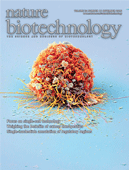 Nature Biotechnology has issued an editorial expression of concern (EOC) for a widely criticized study describing a potentially invaluable new lab tool.
Nature Biotechnology has issued an editorial expression of concern (EOC) for a widely criticized study describing a potentially invaluable new lab tool.
The EOC mentions the lack of reproducibility of the gene-editing technique, known as NgAgo. Alongside it, the journal has published a correspondence which includes data from three separate research groups that cast doubt on the original findings.
According to a spokesperson for the journal, some of the paper’s authors have objected to the decision to issue an EOC.
Earlier this month, we reported on a letter signed by 20 researchers which also raised concerns about the genome-editing activities of NgAgo — and alleged the lab that produced the initial results turned away investigators when they attempted to validate the tool in mammalian cells.
Here’s the EOC, published yesterday:
The editors of Nature Biotechnology are issuing an editorial expression of concern regarding this article to alert our readers to concerns regarding the reproducibility of the original results. At this time, we are publishing the results of three groups (http://dx.doi.org/10.1038/nbt.3753) that have tried to reproduce the results in the critical Figure 4 in the original paper by Han and colleagues, which demonstrates editing of endogenous genomic loci in mammalian cells. None of the groups observed any induction of mutations by NgAgo at any of the loci or under any of the conditions tested above the sensitivity of the assays used. Similar results have been recently reported by a different group of authors in Protein & Cell(doi:10.1007/s13238-016-0343-9).
We are in contact with the authors, who are investigating potential causes for the lack of reproducibility. The authors have been informed of this statement. While the investigations are ongoing, Chunyu Han and Xiao Z. Shen agree with this editorial expression of concern. Feng Gao, Feng Jiang and Yongqiang Wu do not feel that it is appropriate at this time. We will update our readers once these investigations are complete.
The original study, “DNA-guided genome editing using the Natronobacterium gregoryi Argonaute,” has been cited 10 times since it was published in May, according to Clarivate Analytics’ Web of Science, formerly part of Thomson Reuters.
A spokesperson for Nature Biotechnology sent us this statement:
Nature Biotechnology has carefully considered all comments relating to the original paper by Han and colleagues. As in all cases where a paper encounters criticisms after publication, we have undertaken a careful and thorough evaluation of these criticisms. Today, we are publishing not only a Correspondence by Cathomen and colleagues that may refute the main finding of efficient editing of an endogenous gene claimed in the original paper, but also an Editorial Expression of Concern alongside the original paper to ensure that readers are aware of the concerns raised by the paper by Cathomen and colleagues and a report published elsewhere in the literature (doi:10.1007/s13238-016-0343-9) . At this time, two authors of the original paper, Chunyu Han and Xiao Shen, agree with this Editorial Expression of Concern, whereas Feng Gao, Feng Jiang and Yongqiang Wu do not feel that it is appropriate.
Nature Biotechnology believes that it is important for authors to be able to investigate the concerns raised by the Correspondence and to provide additional information and evidence to support their paper if they are able to do so. Thus, we will continue to liaise with the authors of the original paper to provide them with the opportunity to do that by January 2017. An update will be provided to the community at that time.
In the correspondence article, “Failure to detect DNA-guided genome editing using Natronobacterium gregoryi Argonaute,” researchers write:
Despite various attempts to optimize NgAgo-mediated genome editing in three of the reported cell lines, no evidence of successful editing of endogenous target sequences was detected.
One of the few researchers who told Nature that he had managed to use NgAgo for its desired effect confirmed last week that he is now using it for experiments related to his research, and hopes to publish the results soon. However, another researcher who originally gave NgAgo the green light, told Nature last week that the “data is confusing,” and noted that they “cannot make a conclusion.” Both scientists asked to remain unnamed by Nature to avoid getting involved with the controversy.
We’ve reached out to last and corresponding author of the original study, Chunyu Han, who is based at the Hebei University of Science and Technology in Shijiazhuang, China. We’ll update the post if we hear back.
As Nature reported in August:
Han says he receives dozens of harassing calls and texts each day, mocking him and telling him that his career is over — but he is convinced that the technique is sound.
In a letter in Protein & Cell signed by 20 researchers which we covered earlier this month — “Questions about NgAgo” — they wrote:
To gain insights into NgAgo’s utility, some of us have even sent visiting researchers to Han’s laboratory but they were not allowed to perform genome editing experiments involving mammalian cells when they were there. Consequently, none of them returned with any information confirming Han’s data.
Like Retraction Watch? Consider making a tax-deductible contribution to support our growth. You can also follow us on Twitter, like us on Facebook, add us to your RSS reader, sign up on our homepage for an email every time there’s a new post, or subscribe to our daily digest. Click here to review our Comments Policy. For a sneak peek at what we’re working on, click here.
When research is genuine, just an email or phone call will clarify any reproducibility issues. Usually some little thing that other scientists are doing incorrectly. If it comes to requiring scientists to perform the experiments in the authors’ laboratory, it usually does not turn out well. If the authors refuse that courtesy, the answer is clear.
A perspective from China
http://www.sixthtone.com/NEWS/CHINESE-SCIENTISTS-REPRIMANDED-ACADEMIC-JOURNAL